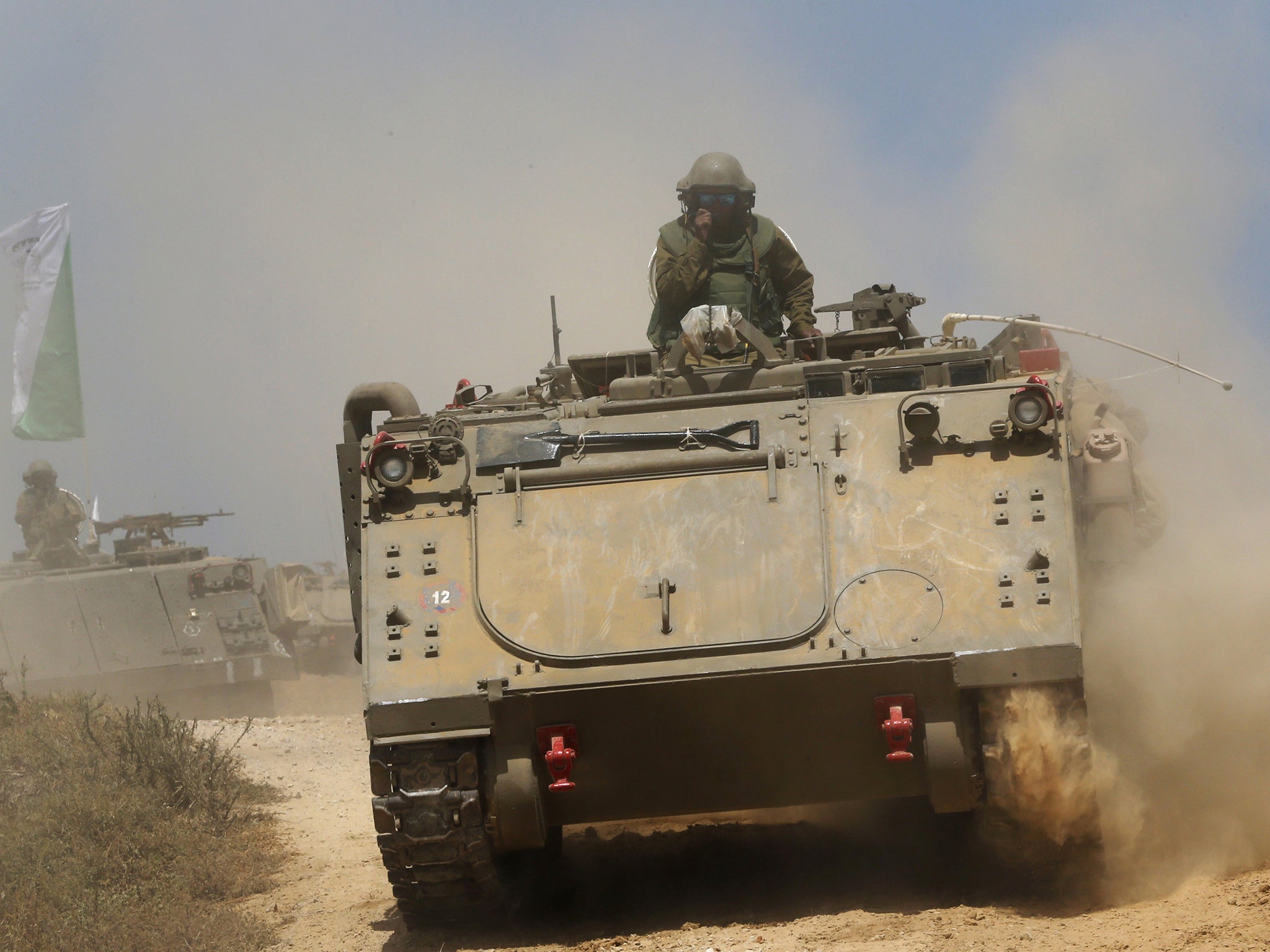Israel-Gaza conflict: Mortar fire causes first Israeli fatality after Hamas rejects ceasefire
Bombing resumes after Palestinian militant group says its demands were not met by Egyptian plans for ceasefire

The Gaza Strip was once again the target of Israeli air strikes yesterday as a proposed ceasefire agreement with the Palestinians collapsed in confusion. The Israeli army said it agreed to cease fire at 9am but Hamas said it was not party to any agreement and continued to fire rockets at Israel.
Sami Abu Zuhri, a Hamas official, said the Egyptian government had not consulted it about a ceasefire. He waved a piece of photocopied paper. “This has been our source of information – the media. No one has told us anything about it. We have not seen a draft of the Egyptian proposal,” he said. “This so-called plan was drawn up by others without consulting Hamas. It is something organised by the Egyptians and the Israelis. Is it a trap? Yes I think it is.”
Dozens of rockets were fired from inside Gaza, towards Haifa in northern Israel, Beer Sheva and at cities between Gaza and Tel Aviv. A volunteer visiting the Erez checkpoint near Gaza became the first Israeli fatality, dying of wounds from a mortar attack. Palestinian health officials said 194 Palestinians had been killed and more than 1,400 injured over the past week.
Benyamin Netanyahu, the Israeli Prime Minister said: “We will significantly broaden our offensive against Hamas. [With the] ceasefire off the table, Hamas is leaving us no choice but to broaden the operation in Gaza.”
Israeli government sources said the first step would be “surgical” incursions into Gaza and then an operation to divide the Strip into three to prevent movement between the areas. Officials said Hamas had fired about 1,000 missiles but 90 per cent of them were intercepted by Israel’s missile-defence system, Iron Dome.
Tony Blair, the Middle East envoy, met Israel’s President, Shimon Peres, before the ceasefire collapsed. “The purpose of this ceasefire is to give us an opportunity to bring genuine hope for the future for the people of Gaza, to have Gaza opened up again to the world, to have Gaza and the West Bank reunited but to do so in a way that gives real and permanent security to the people of Israel, the freedom from rocket attacks, from tunnels, from terrorism,” Mr Blair said.
The resumption of Israeli attacks followed a rare calm in Gaza. The first attempt to end the bloodletting lasted six hours, a strange time of “quiet”, with only fleeting sounds of aircraft and drones. Vapour trails of rockets arched towards Israel, and the end of the truce came with a fierce bombardment on the centre and east of Gaza City, Nusseirat in the central region and Khan Yunis to the south.
The ceasefire seemed to take Hamas by surprise. Officials abroad said they were considering the Egyptian proposal for an end to hostilities and those in Gaza were adamant that they knew nothing about it. In any event, the feeling was that it was a trap designed to damage Hamas.
Speaking at Shifa Hospital in Gaza City, the Hamas spokesman, Mr Abu Zuhri, said: “What were all the sacrifices for if we can’t get our most basic conditions. They are very clear: we want the blockade of Gaza by the Israelis to be lifted, we want the hundreds of prisoners they have arrested to be freed … They know our conditions.”
Another Hamas official, Moshir Al-Masri declared: “Accepting this ceasefire would be accepting defeat. They are saying the Egyptians have drawn this up but the Americans are behind them, and the reason the Americans are involved is because the Israelis are losing. We have defended the people from attacks from air and sea, we can also do so from land. We have thousands of rockets the Israelis don’t know about”. He turned to the crowd around him, asking: “Do you want a ceasefire?” “No,” they shouted back, followed by “God is great.”
Many on the streets took the view that a ceasefire without any guarantees of a better deal for Gaza would be futile. “The Israelis have failed to honour the agreement of the last ceasefire, so why should be believe them this time?”asked Hania Zouab, a 23-year-old student. “Why did 190 people become martyrs?”
Her friend, Bushra, was anxious about what would happen if the strife continued. “Are we prepared for 300 martyrs? 400? 500? Where does it end? Why don’t they just try to talk and see what happens? That is not surrender,” she said.
Hamas’s military wing, the Al-Qassam Brigades, had dismissed the Egyptian deal as “not worth the paper it was written with” and pledged: “Our battle with the enemy is to be continued and we will be loyal to the blood of the martyrs.” It continued to deploy its main weapons – rockets – over the next hours.
Having heard about the possible end to the fighting, Samir Abdurrahman had opened his clothes shop in central Gaza for the first time since the air strikes began. “We are in Ramadan and people go out to shop after Ifthar [the end of the day of fasting], but no one is going out at night now so we have lost all that trade,” he said. “This would have been a good time start and make up for some of those losses, with people buying presents for Eid [the end of Ramadan].”
As he spoke, two rockets trails heading across the border rose from a few hundred metres away. Two hours later, Israeli bombing restarted and Mr Abdurrahman was forced to pull down his shutters, like other shops in the street. “I don’t know how we are going to survive,” he said, shaking his head. “The life is being taken out of Gaza.”
Join our commenting forum
Join thought-provoking conversations, follow other Independent readers and see their replies
Comments
Bookmark popover
Removed from bookmarks